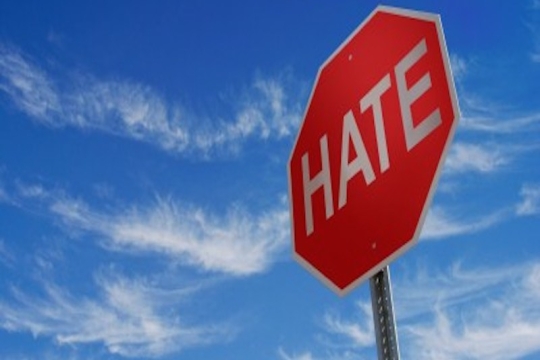
On Monday, the FBI released its annual compilation of hate crimes statistics, which summarizes all hate crimes reported to the FBI in 2019. The grim data underscore the alarming power of hateful ideologies — racism, antisemitism, Islamophobia, homophobia, transphobia, ableism, and other forms of bigotry — to threaten and inflict harm. In total, law enforcement agencies reported 7,314 hate crimes to the FBI, the highest number in more than a decade.
The number of hate crime murders reached a record high of 51, more than doubling the record of 24 set in 2018. Last August, xenophobic hatred took the lives of 22 people in El Paso, Texas, where the shooter deliberately traveled to target immigrants.
Crimes motivated by race, ethnicity, or ancestry constitute 56 percent of all single-bias incidents, with anti-Black hate crimes accounting for nearly 50 percent of racially motivated hate crimes and a plurality of hate crimes across all categories. Religion-based hate crimes, the second-largest category, represent more than 20 percent of incidents. Of religion-based hate crimes reported to the FBI, a majority (nearly 63 percent) targeted Jews, a 14 percent increase in antisemitic attacks from 2018.
Hate crimes against transgender and gender non-conforming individuals rose by 18 percent, following a 41 percent increase in 2018. As the Human Rights Campaign (HRC) explains, this data likely underestimates the true number of attacks carried out against transgender and gender non-conforming people. Since 2013, HRC has independently tracked 157 instances of fatal anti-transgender violence and can only confirm that 6 percent of these killings were investigated as hate crimes. Furthermore, these figures underestimate the true magnitude of anti-transgender violence. When law enforcement or family members refuse to acknowledge the victim’s gender identity, acts of violence are not reported as anti-transgender hate crimes, creating significant gaps in data collection.
The FBI data also do not capture the scale of the threat to those who hold multiple marginalized identities, especially Black transgender women. HRC found that an appalling 91 percent of instances of fatal anti-transgender violence were carried out against Black women, who face the compounding injustices of anti-Blackness, transphobia, and misogyny.
Low levels of trust in law enforcement, especially in Communities of Color and immigrant communities, deter many victims from reporting hate crimes and speaks to the urgent need for police reforms that guarantee equal justice under law, treat People of Color with dignity, and build trust and accountability between law enforcement and the communities they serve. Because official statistics cannot account for these unreported crimes, the FBI’s data underestimate the threat of bias-motivated violence. Last year, 86 percent of participating agencies did not report a single hate crime, which includes more than 70 cities with populations over 100,000. These numbers reflect the clear issue of underreporting rather than the complete eradication of hate crimes in those cities and jurisdictions.
Additionally, law enforcement agencies are not required to submit hate crimes data to the FBI, and participation declined in 2019. Even with 451 fewer agencies submitting data in 2019 than in 2018, the number of reported hate crimes still rose, which makes the statistics even more alarming. Congress is considering legislation that would mitigate the shortcomings of voluntary participation: the Khalid Jabara and Heather Heyer NO HATE Act (S. 2043) and its House companion bill (H.R. 3545) would provide grants that help local law enforcement agencies transition to the National Incident-Based Reporting System and adopt policies that more effectively prevent and address hate crimes.
Better data collection is an essential component of understanding and responding to hate crimes, but it is only one piece of the puzzle. We must also stamp out the climate of hatred that emboldens perpetrators to act on their bigotry. To address hate crimes, we must reaffirm the core principles of our diverse, pluralistic society in which people of all identities ought to be able to live without fear. These principles are existentially important to the American Jewish community. An atmosphere of intolerance has shattered our sense of security; according to a survey conducted two months before the election, 54 percent of likely Jewish voters feel that Jewish Americans are less safe than we were four years ago.
Just weeks ago, we observed the second yahrzeit of the Pittsburgh synagogue shooting. This horrific massacre took place in the context of rising antisemitic incidents, a trend that persisted in 2019. The perpetrator specifically chose to attack the Tree of Life synagogue for hosting a HIAS Refugee Shabbat — a tragic reminder that we are doubly targeted as Jews and as vocal defenders of the vulnerable.
Despite the wishes of those who seek to harm and silence us, acts of hatred will not deter us from standing proudly as Jews and upholding our commitment to “love [the stranger] as yourself” (Leviticus 19:33-34). The FBI’s new data illustrates the tangible dangers of bigotry in the United States today. This sobering portrait underscores the need to strengthen the tools that guard against hatred, and actively promote a culture of acceptance that celebrates all identities.
Get involved with the Reform Movement’s Audacious Hospitality initiative to foster racial diversity, equity, and inclusion, and urge your member of Congress to support the Khalid Jabara and Heather Heyer NO HATE Act.
Related Posts

A Letter to the Jewish Community

We Are Witnessing History


